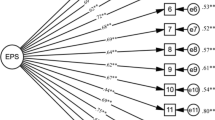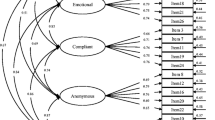Abstract
Prosocial behavior is usually defined as a set of actions aimed to benefit others. This study aims at presenting validity and reliability evidence for the Brazilian version of the Prosocial Tendencies Measure (PTM). The study was conducted with 555 students (Mage= 23,38; SD = 6,24) from public and private universities in southeastern Brazil, 69% being female. The scale showed good evidence of content validity. The internal 6-factor structure was tested by Confirmatory Factor Analysis and showed acceptable goodness-of-fit indices. The Multigroup Confirmatory Factor Analysis (MCFCA) accepted configural, metric and scalar invariance, indicating that the PTM is an equivalent measure for men and women of different age groups. No unexpected response patterns to the instrument’s items were found. Evidence of convergent validity was observed with the Prosociality Measurement Scale (EMPA). The reliability indices obtained indicated adequate internal consistency of the instrument. The adapted scale shows evidence of reliability and validity, making it suitable for use in the Brazilian context.

Similar content being viewed by others
References
American Educational Research Association, American Psychological Association, National Concil on Measurement in Education (2014). Standards for educational and psychological testing.APA. https://www.testingstandards.net/open-access-files.html
Azimpour, A., Neasi, A., Shehni-Yailagh, M., & Arshadi, N. (2012). Validation of “Prosocial tendencies Measure” in iranian University students. Journal Life Science Biomedicine, 2, 34–42.
Batson, C. D., & Powell, A. A. (2003). Altruism and Prosocial Behavior. In T. Millon, M. J. Lerner, & I. B. Weiner(Hrsg.) Handbook of psychology (pp. 463–484). John Wiley & Sons, Inc. https://doi.org/10.1002/0471264385.wei0519.
Borsa, J. C., Damásio, B. F., & Bandeira, D. R. (2012). Adaptação e validação de instrumentos psicológicos entre culturas: Algumas considerações. Paidéia, 22, 423–432. https://doi.org/10.1590/S0103-863X2012000300014.
Brown, T. (2015). Confirmatory Factor Analysis for Applied Research (2o ed). Guilfor Press.
Calderón-Tena, C. O., Knight, G. P., & Carlo, G. (2011). The socialization of prosocial behavioral tendencies among mexican american adolescents: The role of familism values. Cultural Diversity & Ethnic Minority Psychology, 17(1), 98–106. https://doi.org/10.1037/a0021825.
Caprara, G. V., Steca, P., Zelli, A., & Capanna, C. (2005). A new scale for measuring adults’ prosocialness. European Journal of Psychological Assessment, 21(2), 77–89. https://doi.org/10.1027/1015-5759.21.2.77.
Carlo, G. (2014). The development and correlates of prosocial moral behaviors. In Handbook of moral development (Vol. 2, p. 208–234).
Carlo, G., & Randall, B. A. (2002). The development of a measure of prosocial behaviors for late adolescents. Journal of Youth and Adolescence, 31(1), 31–44. https://doi.org/10.1023/A:1014033032440.
Carlo, G., & de Guzman, M. R. T. (2009). Theories and research on prosocial competencies among US Latinos/as. In F. Villaruel, G. Carlo, M. Azmitia, J. Grau, N. Cabrera, & J. Chahin (Eds.), Handbook of U.S. latino psychology (pp. 191–211). Sage Publications.
Carlo, G., Eisenberg, N., & Knight, G. P. (1992). An objective measure of adolescents’ prosocial moral reasoning. Journal of Research on Adolescence, 2(4), 331–349. https://doi.org/10.1207/s15327795jra0204_3.
Carlo, G., Hausmann, A., Christiansen, S., & Randall, B. A. (2003). Sociocognitive and behavioral correlates of a measure of prosocial tendencies for adolescents. The Journal of Early Adolescence, 23(1), 107–134. https://doi.org/10.1177/0272431602239132.
Carlo, G., Knight, G. P., McGinley, M., Zamboanga, B. L., & Jarvis, L. H. (2010). The multidimensionality of prosocial behaviors and evidence of measurement equivalence in mexican american and european american early adolescents. Journal of Research on Adolescence, 20(2), 334–358. https://doi.org/10.1111/j.1532-7795.2010.00637.x.
Cheung, G. W., & Rensvold, R. B. (2002). Evaluating goodness-of-fit indexes for testing measurement invariance. Structural Equation Modeling: A Multidisciplinary Journal, 9(2), 233–255. https://doi.org/10.1207/S15328007SEM0902_5.
Christ, C. C., Carlo, G., & Stoltenberg, S. F. (2016). Oxytocin receptor (OXTR) single nucleotide polymorphisms indirectly predict prosocial behavior through perspective taking and empathic concern. Journal of Personality, 84(2), 204–213. https://doi.org/10.1111/jopy.12152.
Davis, A. N., Martin-Cuellar, A., & Luce, H. (2019). Life events and prosocial behaviors among young adults: Considering the roles of perspective taking and empathic concern. The Journal of Genetic Psychology, 180(4–5), 205–216. https://doi.org/10.1080/00221325.2019.1632785.
DiStefano, C., & Morgan, G. B. (2014). A comparison of diagonal weighted least squares robust estimation techniques for ordinal data. Structural Equation Modeling: A Multidisciplinary Journal, 21(3), 425–438. https://doi.org/10.1080/10705511.2014.915373.
Eisenberg, N., & Fabes, R. A. (1998). Prosocial development. Handbook of child psychology: Social, emotional, and personality development (5th ed., 3 vol., pp. 701–778). John Wiley & Sons, Inc.
Eisenberg, N., Fabes, R. A., & Spinrad, T. L. (2006). Handbook of child psychology. John Wiley & Sons.
Fabes, R., Carlo, G., Kupanoff, K., & Laible, D. (1999). Early adolescence and prosocial/moral behavior I: The role of individual processes. Journal of Early Adolescence, 19, 5–16. https://doi.org/10.1177/0272431699019001001.
Feigin, S., Owens, G., & Goodyear-Smith, F. (2014). Theories of human altruism: A systematic review. Journal of Psychiatry and Brain Functions, 1(1), 5. https://doi.org/10.7243/2055-3447-1-5.
Ferrando, P. J., & Lorenzo-Seva, U. (2018). Assessing the quality and appropriateness of factor solutions and factor score estimates in exploratory item factor analysis. Educational and Psychological Measurement, 78(5), 762–780. https://doi.org/10.1177/0013164417719308.
Gülseven, Z., Kumru, A., Carlo, G., & de Guzman, M. R. (2020). The roles of perspective taking, empathic concern, and Prosocial Moral reasoning in the self-reported prosocial behaviors of Filipino and turkish young adults. Journal of Cross-Cultural Psychology, 51(10), 814–830. https://doi.org/10.1177/0022022120968265.
Hair, J. F., Black, W. C., Babin, B. J., Anderson, R. E., & Tatham, R. L. (2009). Análise multivariada de dados (6o ed). Bookman.
Haukoos, J. S., & Lewis, R. J. (2005). Advanced Statistics: Bootstrapping confidence intervals for statistics with “Difficult” distributions. Academic Emergency Medicine, 12(4), 360–365. https://doi.org/10.1197/j.aem.2004.11.018.
International Test Commission (2010). International Test Commission guidelines for translating and adapting tests. Recovered on March 17, 2023, https://www.intestcom.org/files/guideline_test_adaptation_2ed.pdf.
Krebs, D. L. (1970). Altruism-An examination of the concept and a review of the literature. In Psychological Bulletin (Bd. 73, Nummer 4, S. 258–302).
Kyriazos, T. A. (2018). Applied Psychometrics: Sample size and sample power considerations in factor analysis (EFA, CFA) and SEM in General. Psychology, 9, 2207–2230. https://doi.org/10.4236/psych.2018.98126.
Li, C. H. (2015). Confirmatory factor analysis with ordinal data: Comparing robust maximum likelihood and diagonally weighted least squares. Behavior research methods, 48. https://doi.org/10.3758/s13428-015-0619-7
MacCallum, R. C., Browne, M. W., & Sugawara, H. M. (1996). Power analysis and determination of sample size for covariance structure modeling. Psychological methods, 1(2), 130–149.
McGinley, M., Opal, D., Richaud, M. C., & Mesurado, B. (2014). Cross-cultural evidence of multidimensional prosocial behaviors: An examination of the Prosocial Tendencies measure (PTM). Prosocial development: A multidimensional approach (pp. 258–278). Oxford University Press. https://doi.org/10.1093/acprof:oso/9780199964772.003.0013.
Mestre, M. V., Carlo, G., Samper, P., Malonda, E., & Mestre, A. L. (2019). Bidirectional relations among empathy-related traits, prosocial moral reasoning, and prosocial behaviors. Social Development, 28(3), 514–528. https://doi.org/10.1111/sode.12366.
Ngai, S. S., & Xie, L. (2018). Toward a validation of the Prosocial Tendencies measure among chinese adolescents in Hong Kong. Child Indicators Research, 11(4), 1281–1299. https://doi.org/10.1007/s12187-017-9475-6.
Reckase, M. (1985). The difficulty of test items that measure more Than one ability. Applied Psychological Measurement - APPL PSYCHOL MEAS, 9, 401–412. https://doi.org/10.1177/014662168500900409.
Richaud, M. C., Mesurado, B., & Cortada, A. K. (2012). Analysis of dimensions of Prosocial Behavior in an argentinean sample of children. Psychological Reports, 111(3), 687–696. https://doi.org/10.2466/10.11.17.PR0.111.6.687-696.
Roche, O. R., & Selva, C. (2010). Young prosocial animation. In O. R. Roche (Org.) (Ed.), Prosocialidad nuevos desafios: Métodos y pautas para la optimización creativa del entorno. Ciudad Nueva.
Rodrigues, J., & Hewig, J. (2021, March 15). Let´s call it altruism! A psychological perspective and hierarchical framework of altruism and prosocial behavior. https://doi.org/10.31234/osf.io/pj7eu
Rodrigues, J., Ulrich, N., Mussel, P., Carlo, G., & Hewig, J. (2017). Measuring prosocial tendencies in Germany: Sources of validity and reliability of the revised Prosocial Tendency measure. Frontiers in Psychology, 8, 2119. https://doi.org/10.3389/fpsyg.2017.02119.
Rushton, J. P., Chrisjohn, R. D., & Fekken, C., G (1981). The altruistic personality and the self-report altruism scale. Personality and Individual Differences, 2(4), 293–302. https://doi.org/10.1016/0191-8869(81)90084-2.
Silva, A. V. C. (2016). da. Adaptação Escala de Autorrelato de Altruismo: Um Contributo Português para o Heroic Imagination Project (p. 23) [Dissertação, Universidade Católica Portuguesa]. https://repositorio.ucp.pt/bitstream/10400.14/20878/1/Adriana_Dissertação.pdf
Simões, F., & Calheiros, M. M. (2016). The relations between Prosocial Behaviors and Self-Regulation: Evidences from the validation of the PTM-R for portuguese early adolescents. The Spanish Journal of Psychology, 19, https://doi.org/10.1017/sjp.2016.70. E73. Cambridge Core.
Valentini, F., & Damásio, B. F. (2016). Variância Média Extraída e Confiabilidade Composta: Indicadores de Precisão. Psicologia: Teoria e Pesquisa, 32(2), https://doi.org/10.1590/0102-3772e322225.
Vinuto, J. (2014). A Amostragem em Bola de Neve na Pesquisa Qualitativa: Um Debate em Aberto. 18.
Zhang, Z., & Yuan, K.-H.(2018). Practical Statistical Power Analysis Using Webpower and R (Ed.), Granger, IN:ISDSA Press.
Author information
Authors and Affiliations
Corresponding author
Ethics declarations
Declarations and Statements
-
1
Partial financial support was received from FAPESP (Funda??o de Amparo ? pesquisa do Estado de S?o Paulo) - 2017/06334-9, that was a regular research project of Luciana Maria Caetano and Betania Alves Veiga Dell`Agli, and USP (PUB Programa Unificado de Bolsas da Universidade de S?o Paulo) ? 2779 (Bolsa de Inicia??o Cient?fica de Beatriz Oliveira).
-
2
The authors have no relevant financial or non-financial interests to disclose.
-
3
The research was approved by the Committee on Ethics in Research in Human Beings of the Institute of Psychology of the University of S?o Paulo (CEPH-IPUSP), authorization number 44756621.1.0000.5561. The research instruments and the Informed Consent Form (ICF) were prepared on the Google Forms, and sent via social media (WhatsApp, Facebook, Instagram) and e-mail of university students.
-
4
All authors whose names appear on the submission
-
1)
made substantial contributions to the conception or design of the work; or the acquisition, analysis, or interpretation of data; or the creation of new software used in the work;
-
2)
drafted the work or revised it critically for important intellectual content;
-
3)
approved the version to be published; and
-
4)
agree to be accountable for all aspects of the work in ensuring that questions related to the accuracy or integrity of any part of the work are appropriately investigated and resolved.
-
1)
-
5
All authors contributed to the study conception and design. Material preparation, data collection by Beatriz Oliveira and Rodney da Costa, analysis were performed by K?nia Eliber Vieira and were reviewed by Gustavo Carlo. The first draft of the manuscript was written by Luciana Maria Caetano, the Brazilian version of manuscript was reviewed by Bet?nia Dell`Agli, the English version of manuscript was reviewed by Gustavo Carlo and all authors commented on previous versions of the manuscript. All authors read and approved the final manuscript.
Additional information
Publisher’s Note
Springer Nature remains neutral with regard to jurisdictional claims in published maps and institutional affiliations.
Rights and permissions
Springer Nature or its licensor (e.g. a society or other partner) holds exclusive rights to this article under a publishing agreement with the author(s) or other rightsholder(s); author self-archiving of the accepted manuscript version of this article is solely governed by the terms of such publishing agreement and applicable law.
About this article
Cite this article
Caetano, L.M., Vieira, K.E., da Costa, R.Q.F. et al. Adaptation and Evidence of Validity of the Prosocial Tendencies Measure (PTM) to the Brazilian Context. J Psychopathol Behav Assess 45, 346–358 (2023). https://doi.org/10.1007/s10862-023-10035-x
Accepted:
Published:
Issue Date:
DOI: https://doi.org/10.1007/s10862-023-10035-x




